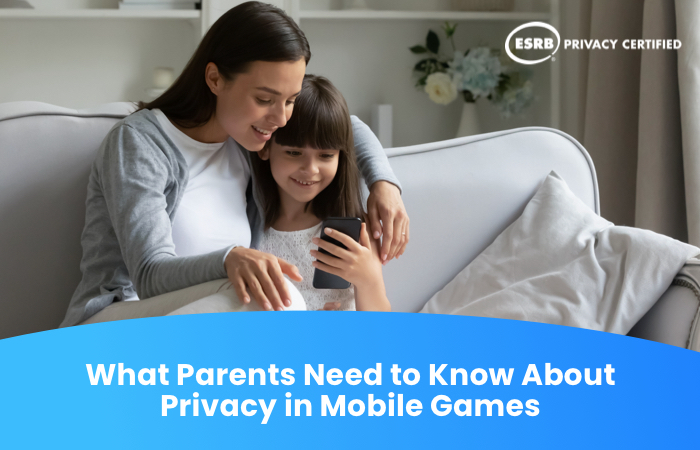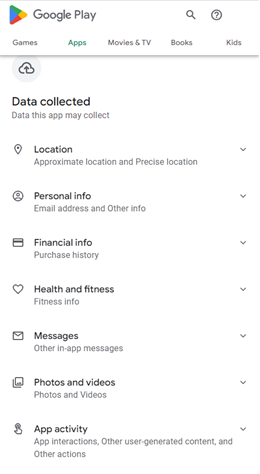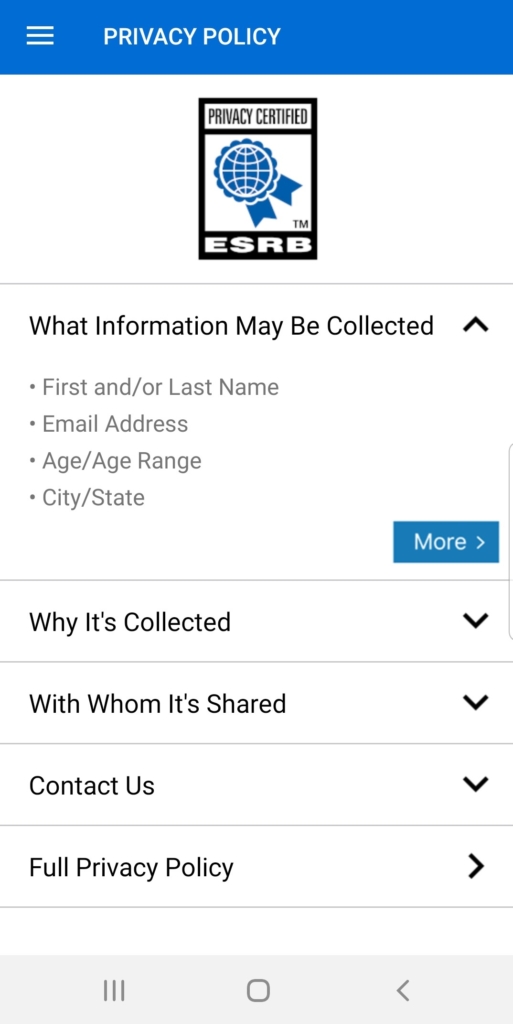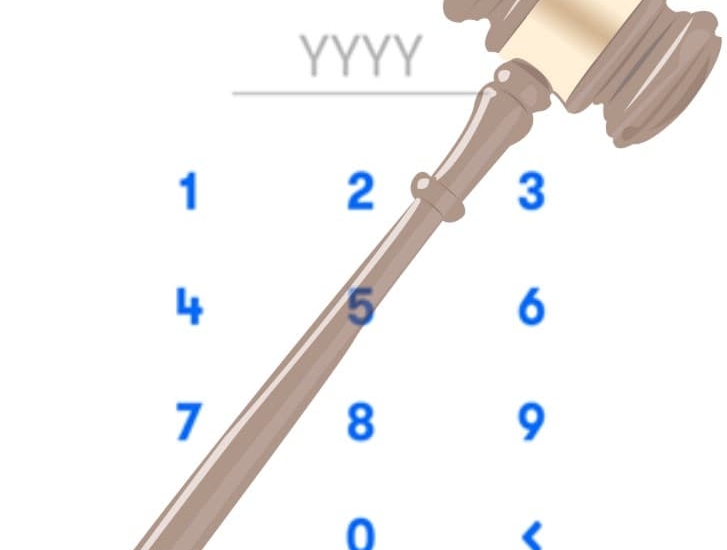What Parents Need to Know About Privacy in Mobile Games: Look for Privacy Labels and Policies

With teens, tweens, and even toddlers using smartphones and tablets, it’s no surprise that mobile games continue to be among the most popular apps. There are lots of upsides to games-to-go for your kids, from entertainment to stress management, and even education! As with all types of products consumed by children, though, parents and caregivers need to stay involved. As we advised in What Parents Need to Know About Mobile Games, there are many steps you can take to make sure your kids have appropriate experiences playing mobile games.
That’s true, too, when it comes to protecting your children’s privacy. Whether your children are using your device or their own, it likely contains lots of sensitive information like personal contacts, location data, photos, and browsing history. And, like most app developers, many mobile game companies make money by selling data and serving ads to their users. That’s especially the case for free-to-play games that don’t cost anything to play up front.
Whether they’re free or not, mobile games and apps use tracking technologies to collect information from and about players. Developers use gameplay data to improve their games, customize the experience, measure progress, iron out bugs, serve personalized ads, detect cheats, comply with laws, and more. To do so, they collect all sorts of data – everything from your child’s birthday and location to what in-game purchases they made.
There are, of course, laws that govern the collection and use of kids’ information. And app stores and game developers also offer many privacy tools for both children and adults. Despite this, it can be hard for parents and caregivers to figure out the maze of privacy laws, settings, and features. So, here are some tips to help protect your children’s privacy.
Tip #1: Look for Privacy Labels and Policies
Most of the games your children play will be ones you or they have downloaded from either the Google Play Store (Android) or the Apple App Store (iOS). As you’ve heard before, you should always check for age and content ratings before your children play games to ensure that the game is age appropriate. ESRB ratings are displayed for all games in the Google Play store.
What you might not know is that the app stores have also introduced “labels” for privacy modeled on nutrition labels on products in the grocery store. Instead of information about calories and nutrients, they have information about a game’s privacy policy and data collection practices. Apple’s “Privacy Information” labels and Google’s “Data Safety” labels differ somewhat, but both have links to the game’s full privacy policy, explain the types of data the game is collecting, what the data will be used for, and whether the game is sharing information with third parties. The labels aim to be user-friendly and written in plain English, but they can still be difficult to understand. Here are a few things to focus on when looking at a privacy label in Google Play or the Apple App store:
- What information the app collects and uses about gamers (including child users) via their account, device, or other details)
- Whether the app collects “location” data, and, if so, whether it is “coarse” (meaning general information such as the city or town you live in) or “precise” (meaning your specific geographic address); and
- Whether the app potentially shares users’ information with third parties.
The app stores have also introduced “labels” for privacy modeled on nutrition labels on products in the grocery store. Instead of information about calories and nutrients, they have information about a game’s privacy policy and data collection practices.
Of course, the labels aren’t perfect. Not all game developers have posted privacy labels, and Google and Apple don’t verify companies’ self-reported info. Plus, some labels do have errors – usually unintentional, due to mistakes or misunderstandings. But they are an important starting point for understanding what kind of data a game collects from its users and your kids, more specifically, and how companies use and share that information.
 Another source of information is a company’s privacy policy. Many mobile game companies now have simple short-form policies or dashboards summarizing key privacy facts such as what information is gathered in a game, where it goes, how it gets used, and whom to contact if you have a problem or question. You can view an example of a short form privacy policy in the ESRB Rating Search app (Android | iOS). And if you want more information, you can always review a company’s full-length privacy policy, which provides much greater detail.
Another source of information is a company’s privacy policy. Many mobile game companies now have simple short-form policies or dashboards summarizing key privacy facts such as what information is gathered in a game, where it goes, how it gets used, and whom to contact if you have a problem or question. You can view an example of a short form privacy policy in the ESRB Rating Search app (Android | iOS). And if you want more information, you can always review a company’s full-length privacy policy, which provides much greater detail.
It’s best to look at a game’s privacy label and privacy policy before your kids start playing. If you want more information afterwards, you can check out Google’s Privacy Dashboard on your Android device to see which apps accessed your child’s data and when. You can also check out the App Privacy Report in your iOS device’s settings to see how often your child’s location, photos, camera, microphone, and contacts have been accessed during the last seven days. Together with the privacy labels, these features can give you a more complete picture of how the apps your children use treat their privacy.
Almost all video game apps have to collect some personal information to function. But if you want to minimize the amount of personal data that is collected, used, and shared about your child, you can look for games that make clear that they won’t use kids’ personal information for any marketing, online advertising, employ any third-party tracking that would directly identify a child, or collect and share precise location information. The privacy labels and other features offered by the app stores such as family programs can help you figure that out.
Remember to check back tomorrow for our next tip!
Click here to continue to Tip #2: Use Parental Controls and Permissions.
• • •
If you have more questions about kids’ privacy in mobile apps or you want to learn more about our program, please reach out to us through our contact page to learn more about our program. Be sure to follow us on LinkedIn for more privacy-related updates.
• • •
 As senior vice president of ESRB Privacy Certified (EPC), Stacy Feuer ensures that member companies in the video game and toy industries adopt and maintain lawful, transparent, and responsible data collection and privacy policies and practices for their websites, mobile apps, and online services. She oversees compliance with ESRB’s privacy certifications, including its “Kids Certified” seal, which is an approved Safe Harbor program under the Federal Trade Commission’s Children’s Online Privacy Protection Act (COPPA) Rule.
As senior vice president of ESRB Privacy Certified (EPC), Stacy Feuer ensures that member companies in the video game and toy industries adopt and maintain lawful, transparent, and responsible data collection and privacy policies and practices for their websites, mobile apps, and online services. She oversees compliance with ESRB’s privacy certifications, including its “Kids Certified” seal, which is an approved Safe Harbor program under the Federal Trade Commission’s Children’s Online Privacy Protection Act (COPPA) Rule.


